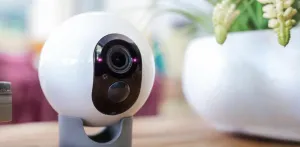Introduction: Why Even Bother with a Home Security Camera?
So, let’s chat about home security cameras. It might feel a bit like inviting Big Brother into your living room, or perhaps it conjures images of spy movies where the hero deftly avoids being seen. But, believe it or not, getting a home security camera is way less about espionage and all about peace of mind. I remember the day I decided to get one—I had just heard that my neighbor's bike got stolen right from their front yard. It struck a chord. What if it had been more than a bike? My thoughts spiraled to all sorts of scenarios, and I realized knowing is better than wondering. If you wish to know more about how security cameras can protect your peace of mind, check out the benefits of having a home security camera system.
Understanding Your Needs: More Than Just Watching
First things first: why do you need a security camera? Is it to watch for package thieves, keep an eye on the car, monitor a mischievous pet, or perhaps make sure the kids got home safely from school? Your purpose can hugely dictate what features you’ll find essential. For instance, when I finally got my camera, the crispness of the video feed was crucial (because squinting at grainy night-time footage is no help to anyone). Also, it needed to be something more discreet than an eyesore. I mean, who wants their home to look like a mini-fortress? To better understand which features to prioritize, explore this guide on understanding home security camera features.
Key Features to Consider
- Video Quality: Don't settle for anything less than 1080p. You’ll thank yourself each time you zoom in to discern a face or license plate.
- Field of View: A wide angle might mean fewer cameras covering the same area. Remember, more coverage usually means better security.
- Night Vision: Since a lot of sneaky behavior happens under the cover of darkness, good night vision isn’t just nice; it’s necessary.
- Storage Options: Cloud storage sounds heavenly until you hit those monthly fees; local storage sounds great until it fills up. Consider what you’re comfortable with in terms of accessibility and ongoing costs.
- Smart Features: Motion detection, facial recognition, and integration with other smart home devices can elevate the usefulness of your camera from “nice” to “necessity.”
One time, I got an alert on my phone from my camera—it was detecting motion at the front door. Heart pounding, I checked to see... a squirrel. He was doing a curious dance on the mat. It was hilarious, after the adrenaline rush wore off. But it highlighted why having a motion detector was worth it—it was sensitive enough to catch a half-pound squirrel! (pcmag.com)
Wired vs. Wireless: Know the Drill (Or Lack Thereof)
Choosing between wired and wireless cameras can feel a bit like deciding between tea or coffee in the morning. Both have perks; both have drawbacks. Wired systems are generally more reliable (no battery life issues) and can handle larger data. The downside? The installation can be a hassle. I mean, who wants to drill holes in their beautifully painted walls?
Wireless cameras, on the other hand, offer flexibility and ease of installation. You can literally stick them on and move them around as needed. But keep an eye on battery life—nothing's worse than your security camera conking out just when you needed it most. Investing in high-quality batteries or a solar-powered option might save a lot of grief (and missed footage). If you’re leaning toward flexibility, check out whether wireless home security cameras are right for you.
Investment and Installation: What’s the Real Cost?
Let's not skirt around the money talk. Security cameras range from surprisingly inexpensive to “Oh, wow, that’s gonna dent the budget”. Beyond the upfront cost, consider the installation fees and any recurring costs, like monthly subscriptions for cloud storage. I went with a mid-range option that didn't break the bank but offered good clarity and reliable performance.
The installation process can be a DIY project if you’re handy (or have a friend who owes you a favor). Many newer models come with pretty straightforward instructions—some even have apps that guide you through the setup. If DIY isn’t your style, paying a professional can ensure everything’s done right the first time (and no random wires hanging out).
Brand Matters: Picking a Trusted Manufacturer
Choosing a maker for your home security camera is akin to picking a favorite coffee brand. You want a reliable one that won’t let you down. Look for brands with solid after-sales support, good warranty periods, and positive reviews. It helps to see what experiences others have had, which is why I spent a couple of hours scrolling through online reviews and tech forums before making my choice.
Privacy Concerns: Staying on the Right Side of Big Brother
Now, onto the point about Big Brother watching. It’s crucial to understand how and where your data is stored and used. Opt for cameras with encryption and read the privacy policy thoroughly—a dull read, sure, but necessary. It's all about finding that balance between keeping an eye on your space and respecting others' privacy.
Conclusion: A Wise Eye at Home
In the sea of options and features, finding the perfect home security camera may feel daunting, but it’s ultimately about making your home feel safer and giving yourself a bit of ease. Whether it’s catching porch pirates or just capturing footage of wildlife rummaging through your bins at night, a good security camera can make all the difference. So, take the time, do your research, and choose wisely—your future self will thank you for that extra layer of security.
I hope this guide has shed some light on the essentials and perhaps even entertained you a bit (reminder: squirrel dance). Remember, the best security setup is one that fits seamlessly into your life and leaves you feeling protected—without turning your home into Fort Knox. Happy camera hunting!





